Chargaff - Study guides, Class notes & Summaries
Looking for the best study guides, study notes and summaries about Chargaff? On this page you'll find 192 study documents about Chargaff.
Page 2 out of 192 results
Sort by
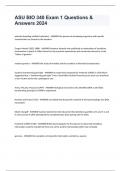
-
ASU BIO 340 Exam 1 Questions & Answers 2024
- Exam (elaborations) • 18 pages • 2024
-
Available in package deal
-
- $9.99
- + learn more
ASU BIO 340 Exam 1 Questions & Answers 2024 selective breeding (artificial selection) - ANSWER-the process of developing organisms with specific characteristics as chosen by the breeders Gregor Mendel () - ANSWER-Amateur botanist who published an explanation of hereditary transmission in plants in 1866. Known for his pea-plant experiments and commonly referred to as the "father of genetics" modern genetics - ANSWER-the study of heredity and the variation of inherited characteristics...
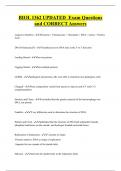
-
BIOL 1362 UPDATED Exam Questions and CORRECT Answers
- Exam (elaborations) • 10 pages • 2024
-
- $8.49
- + learn more
Largest to Smallest - Genome > Chromosome > Chromatin > DNA > Genes > Nucleic Acid DNA Polymerase III - synthesizes new DNA only in the 5' to 3' direction Leading Strand - has one primer Lagging Strand - has multiple primers Griffith - pathogenic pneumonia cells were able to transform non-pathogenic cells Chargaff - base composition varied from species to species and A-T and C-G complementation Hershey and Chase - concluded that the genetic material of the bacteriophag...
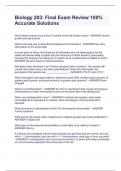
-
Biology 203: Final Exam Review 100% Accurate Solutions
- Exam (elaborations) • 11 pages • 2024
-
Available in package deal
-
- $12.99
- + learn more
What cellular events occur in the G1 phase of the cell division cycle? - ANSWER normal growth and cell function What is the best way to describe homologous chromosomes? - ANSWER they carry information for the same traits In some parts of Africa, the frequency of individuals who are heterozygous for the sickle-cell anemia allele is higher than the frequency in North America, presumably because this reduces the frequency of malaria. Such a relationship is related to what? - ANSWER Darwin's ...
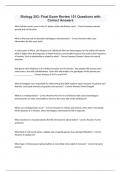
-
Biology 203: Final Exam Review 151 Questions with Correct Answers
- Exam (elaborations) • 14 pages • 2024
- Available in package deal
-
- $11.99
- + learn more
Biology 203: Final Exam Review 151 Questions with Correct Answers What cellular events occur in the G1 phase of the cell division cycle? - Correct Answers normal growth and cell function What is the best way to describe homologous chromosomes? - Correct Answers they carry information for the same traits In some parts of Africa, the frequency of individuals who are heterozygous for the sickle-cell anemia allele is higher than the frequency in North America, presumably because this reduces ...
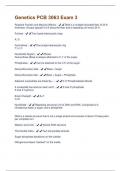
-
Genetics PCB 3063 Exam 3 Questions And Answers Rated 100% Correct
- Exam (elaborations) • 10 pages • 2024
- Available in package deal
-
- $7.99
- + learn more
Rosalind Franklin and Maurice Wilkins - ️️DNA is a multiple-stranded fiber of 20 A thickness. Groups spaced 3.4 A along the fiber and a repeating unit every 34 A. Purines - ️️Two fused heterocyclic rings A, G Pyrimidines - ️️One single heterocyclic ring T, U, C Nucleotide Sugars - ️️Ribose Deoxyribose (Base is always attached to C-1' of the sugar. Phosphates - ️️Can be attached to the C-5' of the sugar. Deoxyribonucleo-side - ️️Base + Sugar Deoxyribonucleo...
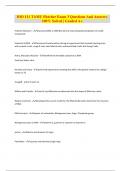
-
BIO 111 TAMU Fletcher Exam 3 Questions And Answers 100% Solved | Graded A+
- Exam (elaborations) • 9 pages • 2024
- Available in package deal
-
- $11.48
- + learn more
BIO 111 TAMU Fletcher Exam 3 Questions And Answers 100% Solved | Graded A+ Friedrich Miescher - discovered DNA in 1869 But did not know (Isolated phosphate) rich acidic compounds Frederick Griffith - Discovered transformation during an experiment that involved injecting mice with smooth S cells, rough R cells, heat-killed S cells, and heat-killed S cells with living R cells. Avery, MacLeod, McCarty - Identified the heritable substance as DNA Used test tubes- vitro Hershey and Chase - per...
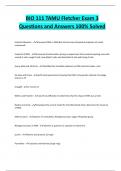
-
BIO 111 TAMU Fletcher Exam 3 Questions and Answers 100% Solved
- Exam (elaborations) • 8 pages • 2024
- Available in package deal
-
- $10.99
- + learn more
BIO 111 TAMU Fletcher Exam 3 Questions and Answers 100% Solved Friedrich Miescher - discovered DNA in 1869 But did not know (Isolated phosphate) rich acidic compounds Frederick Griffith - Discovered transformation during an experiment that involved injecting mice with smooth S cells, rough R cells, heat-killed S cells, and heat-killed S cells with living R cells. Avery, MacLeod, McCarty - Identified the heritable substance as DNA Used test tubes- vitro Hershey and Chase - performed e...
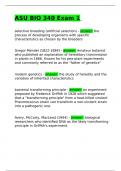
-
ASU BIO 340 Exam 1
- Exam (elaborations) • 31 pages • 2024
-
- $14.99
- + learn more
selective breeding (artificial selection) the process of developing organisms with specific characteristics as chosen by the breeders Gregor Mendel () Amateur botanist who published an explanation of hereditary transmission in plants in 1866. Known for his pea-plant experiments and commonly referred to as the "father of genetics" Previous Play Next Rewind 10 seconds Move forward 10 seconds Unmute 0:00 / 0:15 Full screen Brainpower Read More modern genetics the st...
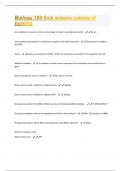
-
Biology 189 final arizona college of nursing Questions and Answers 2024 ,2025 Fully Solved 100%
- Exam (elaborations) • 10 pages • 2024
- Available in package deal
-
- $7.99
- + learn more
Are mutations in exons or introns more likely to result in an altered protein? - Exons Are mutations permanent or temporary changes in the DNA sequence? - Permanent changes in the DNA Avery - genes are composed of DNA , DNA (not proteins) can transform the properties of cells deletion mutation - a mutation in which one or more pairs of nucleotides are removed from a gene Does crossing over occur in mitosis? - No, only in meiosis Does meiosis result in diploid or haploid cells? - haploid ...
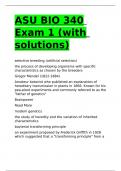
-
ASU BIO 340 Exam 1 (with solutions)
- Exam (elaborations) • 29 pages • 2024
-
- $14.99
- + learn more
selective breeding (artificial selection) the process of developing organisms with specific characteristics as chosen by the breeders Gregor Mendel () Amateur botanist who published an explanation of hereditary transmission in plants in 1866. Known for his pea-plant experiments and commonly referred to as the "father of genetics" Previous Play Next Rewind 10 seconds Move forward 10 seconds Unmute 0:01 / 0:15 Full screen Brainpower Read More modern genetics the study ...

Did you know that on average a seller on Stuvia earns $82 per month selling study resources? Hmm, hint, hint. Discover all about earning on Stuvia


